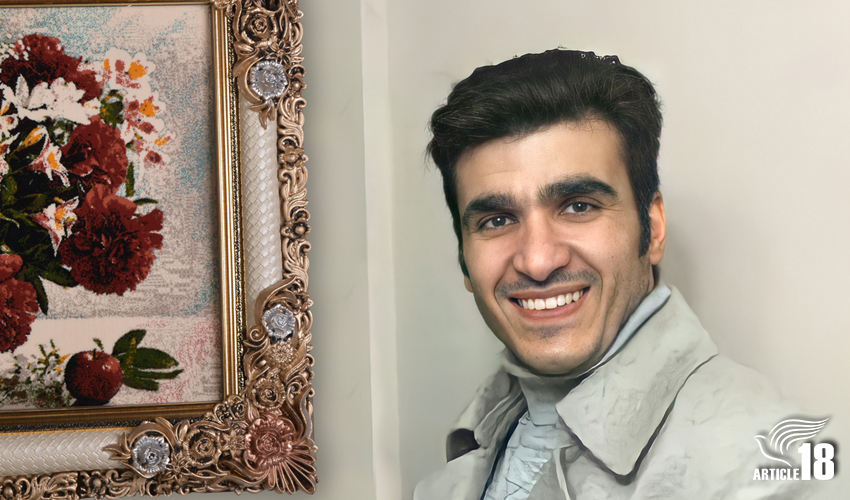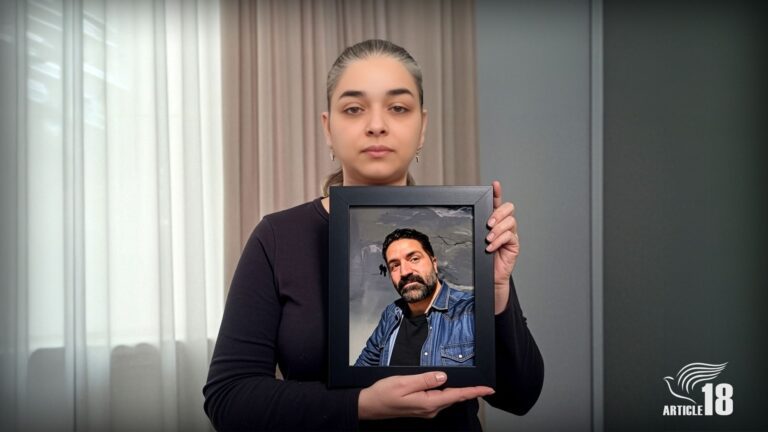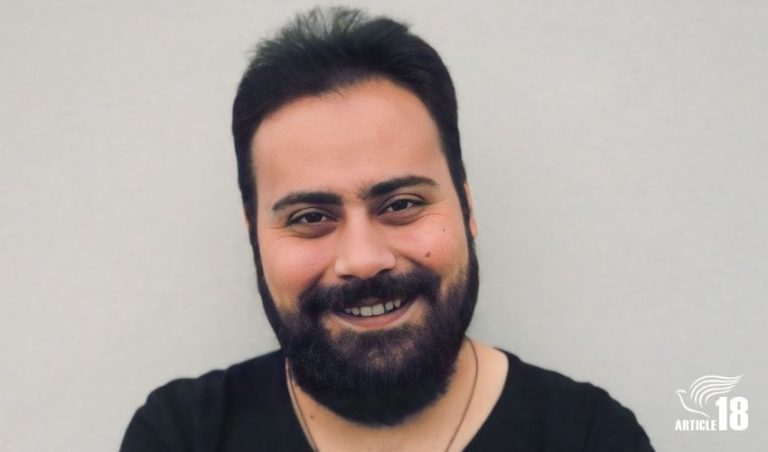
“Suffocating.” That’s the word Christian convert Alireza Mohammadpour uses to describe his treatment by agents of Iran’s Ministry of Intelligence, treatment that ultimately led him to flee his homeland.
The 31-year-old, who is known as Parham, is now one of hundreds of Iranian Christian refugees awaiting resettlement in Turkey.
But like so many of them, he says he never wanted to leave Iran but was forced to do so.
And several times, as he reflects on the events that led him to flee his home in October 2016, he comes back to that word, “suffocating”. It’s a word that seems to sum up his entire experience.
It all began on the evening of 10 November 2015. It was 10.30pm, and Parham was with two friends in the garage they had rented in Andisheh, west of Tehran, to use as a base for their new business, selling everyday products.
Parham recalls the excitement they felt and “great expectations” for what their new venture could become.
But then there was a knock on the door, and a man’s voice called out: “Excuse me, I hit your car. Please come and take a look.”
When the friends opened the door, there were eight men standing there, wearing balaclavas and carrying guns.
“I was very scared, and thought they were thieves,” Parham explains. “Then one of them slapped me hard across my face, and said: ‘Lie on the floor!’”
The men introduced themselves as agents of the Ministry of Intelligence, and pulled out a warrant with the names of Parham’s two friends – and fellow Christian converts – on it.
Parham’s friends were arrested on the spot, while Parham was told: “Thank God that your warrant hasn’t been issued yet! The verdict of your friends is clear: they are facing life imprisonment or execution!”
Parham was then bundled into a car and questioned about the house-church he and his friends belonged to.
“We have had you under surveillance for about three months, and now we decided to come for you,” he was told, as they dropped him off on the edge of town. “So don’t think you’re free! We’ll contact you soon, and you must come for interrogation.”
From that moment on, it is clear Parham was gripped by the “suffocating” fear of which he speaks.
It was apparent as he took a circuitous route home, “going from street to street to find a public telephone, and also to confuse them in case they were following me”.
It was there as Parham frantically tried to call his pastor, several times, but there was no answer.
And it was there the next day, as Parham, “full of stress and worry”, couldn’t eat a thing all day.
The following day, Parham called another Christian friend – again from a public telephone – to explain with code-words that his “colleagues were taken to hospital because of a gas leak, but I’m fine and was allowed to go”.
On his way to meet this friend, Parham says he was “very scared and thought I was being followed. That’s why I went to different places, getting rides with different drivers, until I reached my friend’s plumbing shop”.
And it was there Parham discovered the reason his pastor hadn’t answered.
On the evening of the garage raid, intelligence agents had also raided the properties of Christians belonging to the same house-church network in cities across the country.
For the next few days, until his summons for interrogation, Parham says “every second passed slowly for me, and I thought every moment about the interrogations I would have to face and the questions they might ask me.
“I even said to myself that my friends were lucky they had been arrested, so at least they didn’t have this time of anxiously worrying about when it might happen.”
When, two days later, the call came, Parham says “I hugged my mother tightly, thinking I might never see her again”.
One of the most striking moments in what followed, as Parham was interrogated four times over the next 18 days, was the agents’ disregard for Parham’s disability.
It was this disability – because of which Parham was registered with the state welfare organisation – that ultimately led to his conversion to Christianity two years earlier.
He speaks of the “shame” his father had felt in having two disabled children – his elder sister also being disabled – and how his father told him: “God certainly knew you weren’t going to be a good person, and that’s why He caused you to suffer in this way!”
Parham became a Christian after reading Jesus’ response to a question about a man born blind, in the Gospel of John, chapter 9: “Neither this man nor his parents sinned, but this happened so that the works of God might be displayed in him.”
“That answer took away the heavy burden that had been with me for all 22 years of my life,” Parham says. “Suddenly the lightness and peace that I had been looking for, for years, came over me and I knelt with great eagerness and said: ‘God, I invite you into my life!’”
Parham remembers the date, 12 December 2013, and even the time: 9.30pm.
But though inwardly Parham felt free, his disability remained, and became particularly apparent during moments of high stress – such as the moment he arrived for his first interrogation.
“When I get anxious, I can’t move very well and I lose balance,” Parham explains, “so I said, ‘I have a disability. Please take my hand and help me to get out of the car.’
“The man took my hand and I got out of the car. Then he said: ‘There is a step in front of you; be careful.’
“I asked him to help me up the stairs. He said: ‘Tell Jesus Christ to come and take your hand!’ Then my foot hit the stairs, and I fell hard onto the ground.
“The agent put his foot on my neck and said sarcastically: ‘You see now that Jesus Christ isn’t alive? Otherwise he would have taken your hand!’”
Although he wasn’t physically beaten – beyond the foot on his neck – Parham says the “many” agents who interrogated him “created a terrifying atmosphere by constantly shaking my chair. I could also hear the sounds of other prisoners being tortured and found it difficult to breathe several times. I felt like I was suffocating”.
But even once Parham’s interrogations were over, this “suffocating” pressure continued.
Parham describes being unable to shift the feeling that he was being watched, wherever he went.
“Whenever I wasn’t at home, I always felt like I was being followed,” he says, “and sometimes I was sure.
“If on the bus anyone approached me, I thought they were trying to put a listening or tracking device on my clothes. That’s why, whenever I went home, I threw all my clothes in the wash.
“After the final interrogation, I actually threw all my clothes away – even my jacket – because I was afraid they had put a listening or tracking device in them.”
Parham also sold his new computer, once the intelligence agents returned it to him.
Ever since the garage raid, it seemed the Ministry of Intelligence agents had made it their mission that Parham and his two friends would leave Iran.
The state welfare organisation was supposed to provide jobs for Parham, but following his arrest his employer told him could not work there because he was a “promoter of Christianity” – it was written on his record.
As their trial date neared, Parham and his friends were told: “Either leave Iran, or stay and you’ll have to go to prison for about three to five years.
“I thought to myself, ‘How long will all this stress and anxiety last? These pressures will make my mother [who had heart disease] sicker and sicker, and if I get married and have children in the future, my family will also face this torture and these threats. And it won’t be easy for me to find a job, or any source of income.’
“So, although I never wanted to, I was forced to leave Iran.”
Parham flew to Turkey on 21 October 2016, where he was designated the city of Eskişehir, near Istanbul, to stay as he awaits resettlement.
But, again, like so many others, Parham’s wait goes on. And while his situation is less critical than it was in Iran, it remains far from easy.
Parham speaks of the “loneliness” he has felt, not seeing his family once since he left, while he has also suffered significant weight loss due to a lack of food after his application for a special allowance as a disabled person was rejected.
“I applied to the Turkish organisation for the disabled,” he explains. “One of my friends, who is paralysed and uses a wheelchair, receives a thousand liras a month. But because I don’t use a wheelchair, I was told, ‘You aren’t paralysed, so no amount of money will be allocated for your disability.’
“I went to cafes and restaurants to find work, and asked employers to hire me even to just wash toilets, but they rejected my request and said, ‘You are disabled; we can’t hire you.’
“I once went to a Turkish institution for financial support. The person in charge of that section, when he saw the cross around my neck, asked me, ‘Are you a Christian?’ I said ‘yes’.
“He replied: ‘We don’t help hungry Christians. Even if we had a budget, we’d help hungry Muslims.’
“So I started to make and sell pickled vegetables so I could pay the rent.”
As with so many others, fleeing Iran has saved Parham from the suffocating pressure of the intelligence agents of the Islamic Republic, but it has not brought an end to his troubles.
You can read Parham’s full Witness Statement here.



0 Comments
Trackbacks/Pingbacks